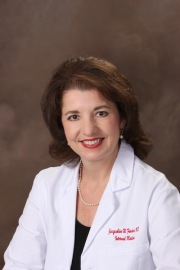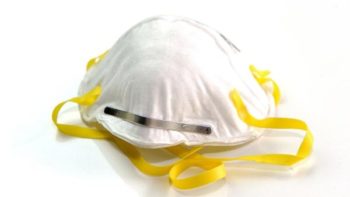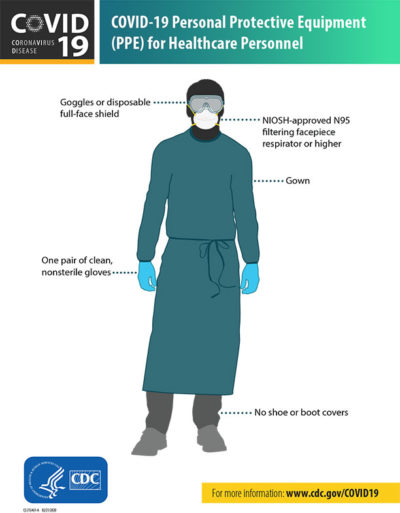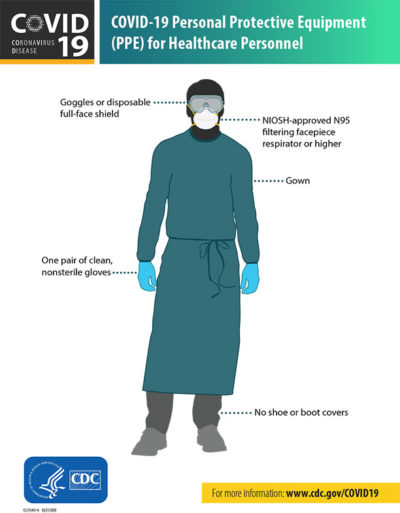Georgia physicians say they’re worried about not having enough protective gear when potential coronavirus patients arrive at their offices.
This personal protective equipment (PPE) means full hospital gowns, masks, gloves, and face shields and goggles for a doctor or other medical provider to wear while examining a possible COVID-19 patient.

Jacqueline Fincher, a Thomson physician who is president-elect of the American College of Physicians, told GHN that there is a “very limited supply, and major vendors [are] already letting us know supplies will be limited.’’
“It’s keeping me up every night,’’ said Kelly Ladd, CEO of Piedmont Internal Medicine Associates, which has two Atlanta-area offices.
“We are down to eight boxes of surgical masks,’’ Ladd told GHN, adding that some patients have been stealing masks. “We have no idea when we will get shipments in. We have gloves ordered but they’re on back order.’’
Ladd said the physician offices are also running out of some disinfectant materials.
“We’re trying to think about how we can make surgical masks,” she quipped.
The challenge for doctors would occur when a patient with respiratory symptoms arrives at an office, seeking care or a test. The proper protocol is for patients to call ahead and get advice over the phone, and possibly be advised to stay home or contact a Public Health call line if the patient is not very ill. Sicker patients may be steered to a hospital ER.

But as the spread of coronavirus continues in Georgia, there will likely be some patients who will slip through, said one metro Atlanta doctor who requested anonymity. Such a patient who showed up unexpectedly would be given a mask to wear and put in a separate isolation room, the doctor said. Then a medical provider wearing full gown, mask and face shield would examine the person.
The doctor said his county public health department hasn’t been able to help him with this issue. He added that many patients have limited medical literacy and may not follow the public admonition to call first.
Dr. Joseph Stubbs, an Albany internist, said, “We want to conserve whatever [PPE] we have. There’s a danger we can run out. If we run out of what we’ve got, [the concern is] there won’t be any more.’’
Stubbs said he hopes the coronavirus crisis will lead the federal government to create a stockpile of PPE for a future outbreak.
Many items made in Asia
The shortage is not just a Georgia problem.
“Federal and state governments and other stakeholders should work with manufacturers of personal protective equipment, and provide sufficient funding, to ensure an adequate supply,” Dr. Robert McLean, president of the American College of Physicians, said in a statement Wednesday. “ACP is also concerned that there may not be sufficient supplies of personal protective equipment available to meet the urgent and growing need related to testing and treatment of COVID-19.”
The CDC says on its website that PPE supplies are affected by decreases in exports from manufacturers in countries such as China, India, Taiwan, and increases in demand amid the global outbreak.
Manufacturers report challenges in meeting those supply demands. “At present, shortfalls may be anticipated to continue for the next 3–4 months,’’ the CDC says on its website. The federal agency posted new guidelines Tuesday that said “the supply chain of respirators cannot meet demand” and that looser fitting surgical face masks “are an acceptable alternative” to n-95 respirator masks.
Last week, the World Health Organization warned of a potential shortage of personal protective equipment.

Hospitals also are concerned about getting enough protective gear.
“Our supply chain team is working as hard as it can to deal with these difficult circumstances,’’ Piedmont Healthcare told GHN.
“We are very carefully managing the supplies that we have and what we need according to guidelines outlined by the CDC.’’
At Evans Memorial Hospital in Claxton, CEO Nikki NeSmith said, “We’re having trouble ordering supplies.’’
The commissioner of the Department of Public Health, at a recent news conference, said the agency is working on the PPE supply issue in Georgia.
A spokesman for the Medical Association of Georgia said, “We are hearing that medical practices need more supplies and kits to test patients who have mild symptoms.’’
Patients who exhibit more acute symptoms should call their primary care physician before going to the doctor’s office or to an urgent care center or emergency room, to ensure that the facility is adequately equipped, said the MAG spokesman, Tom Kornegay.
Ladd said the Piedmont internist practice now has about 50 full PPE kits. The fear, she said, is that PPE are being rationed, sent to hospitals and health centers as a first priority.
“Right now I’m extremely frustrated,’’ she said. “We want to serve our patients and keep our staff healthy.’’

